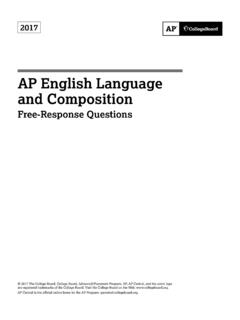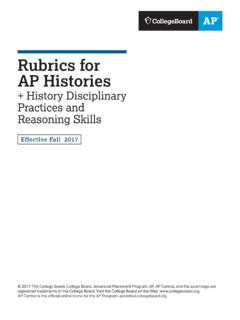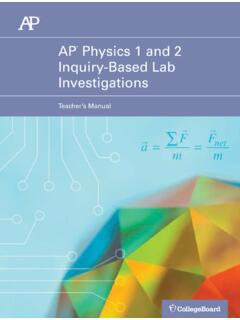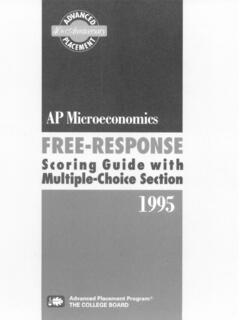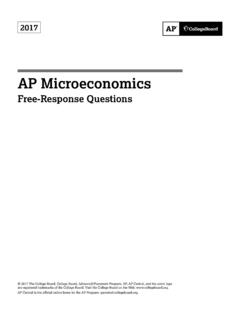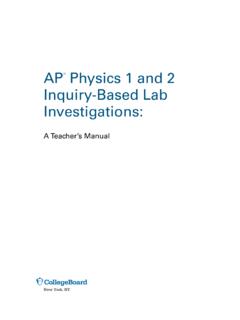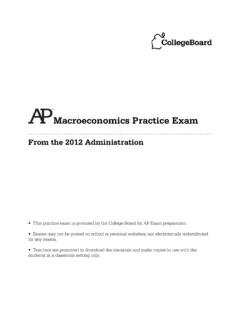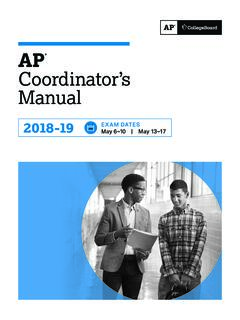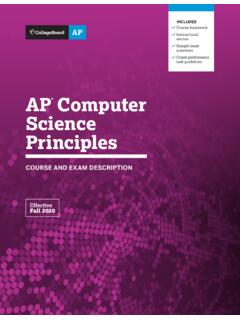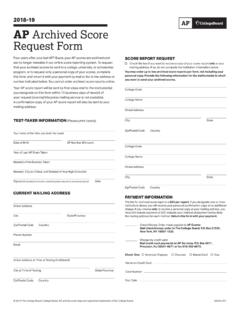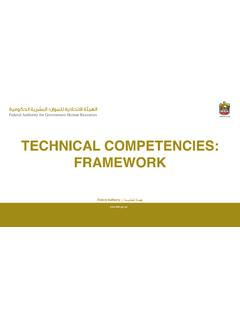Transcription of COURSE AND EXAM DESCRIPTION - AP Central
1 AP English Literature and CompositionCOURSE AND EXAM DESCRIPTIONE ffective Fall 2020 INCLUDES COURSE framework Instructional section Sample exam questionsAP COURSE AND EXAM DESCRIPTIONS ARE UPDATED PERIODICALLYP lease visit AP Central ( ) to determine whether a more recent COURSE and exam DESCRIPTION is Fall 2020AP English Literature and CompositionCOURSE AND EXAM DESCRIPTIONA bout College BoardCollege Board is a mission-driven not-for-profit organization that connects students to college success and opportunity. Founded in 1900, College Board was created to expand access to higher education.
2 Today, the membership association is made up of over 6,000 of the world s leading educational institutions and is dedicated to promoting excellence and equity in education. Each year, College Board helps more than seven million students prepare for a successful transition to college through programs and services in college readiness and college success including the SAT and the Advanced Placement Program. The organization also serves the education community through research and advocacy on behalf of students, educators, and schools. For further information, visit Equity and Access PolicyCollege Board strongly encourages educators to make equitable access a guiding principle for their AP programs by giving all willing and academically prepared students the opportunity to participate in AP.
3 We encourage the elimination of barriers that restrict access to AP for students from ethnic, racial, and socioeconomic groups that have been traditionally underrepresented. Schools should make every effort to ensure their AP classes reflect the diversity of their student population. College Board also believes that all students should have access to academically challenging coursework before they enroll in AP classes, which can prepare them for AP success. It is only through a commitment to equitable preparation and access that true equity and excellence can be : Sonny Mui and Bill Tully 2020 College Board.
4 College Board, Advanced Placement, AP, AP Central , and the acorn logo are registered trademarks of College Board. All other products and services may be trademarks of their respective owners. Visit College Board on the web: v Acknowledgments 1 About AP 4 AP Resources and Supports 6 Instructional Model 7 About the AP English Literature and Composition COURSE 7 College COURSE Equivalent 7 PrerequisitesCOURSE FRAMEWORK 11 Introduction 13 COURSE Framework Components 15 Big Ideas and Enduring Understandings 18 COURSE Skills 20 COURSE at a Glance 25 Unit Guides 27 Using the Unit Guides 31 UNIT 1: Short Fiction I 39 UNIT 2: Poetry I 47 UNIT 3.
5 Longer Fiction or Drama I 55 UNIT 4: Short Fiction II 65 UNIT 5: Poetry II 75 UNIT 6: Longer Fiction or Drama II 85 UNIT 7: Short Fiction III 95 UNIT 8: Poetry III 103 UNIT 9: Longer Fiction or Drama IIIINSTRUCTIONAL APPROACHES 115 Organizing the COURSE 117 Selecting and Using COURSE Materials 118 Developing COURSE SkillsEXAM INFORMATION 135 Exam Overview 140 Task Verbs Used in Free-Response Questions 141 Sample Exam QuestionsReturn to Table of Cont 2020 College Boarentsd | AP English Literature and Composition COURSE and Exam DescriptioniiiSCORING GUIDELINES 153 Question 1: Poetry Analysis 158 Question 2: Prose Fiction Analysis 162 Question 3.
6 Literary ArgumentAPPENDIX 169 AP English Literature and Composition Conceptual FrameworkAcknowledgmentsCollege Board would like to acknowledge the following contributors for their assistance with and commitment to the development of this COURSE . All individuals and their affiliations were current at the time of Bobo, Educational Testing Service, Princeton, NJSusie Bonsey, Buckingham Browne & Nichols School, Cambridge, MAJennifer Brady, Harvard University, Cambridge, MALes Burns, University of Kentucky, Lexington, KYEileen Cahill, Salem Academy, Winston-Salem, NCWarren Carson, University of South Carolina Upstate, Spartanburg, SCTerry Caruso, University High School, Tolleson, AZ Beverly Ann Chin, University of Montana, Missoula, MTKim Coles, University of Maryland, College Park, MDKate Cordes.
7 Billings Senior High School, Billings, MTAmy Craig, Educational Testing Service, Princeton, NJNatalie Croney, Bowling Green High School, Bowling Green, KYElizabeth Davis, College Station High School, College Station, TXRudy dela Rosa, Seven Lakes High School, Katy, TXJim Egan, Brown University, Providence, RICarlos Escobar, Felix Varela Senior High School, Miami, FLThomas Foster, University of Michigan-Flint, MIMarcella Frydman Manoharan, Harvard University, Cambridge, MATony Harris, Saint Ignatius College Prep, Chicago, ILEric Idsvoog, Milton Academy, Milton, MAMinaz Jooma, Millburn High School, Millburn, NJKathy Keyes, Cathedral High School, Indianapolis, INMaia McAleavey, Boston College, Boston, MARebecca McFarlan, Indian Hill High School, Cincinnati, OHDavid Miller, Mississippi College, Clinton, MSKay Moon, Boston Latin School, Boston, MAJennifer Nash, Highlands High School, Fort Thomas, KYErik Powell, Ferris High School, Spokane, WALisa Schade-Eckert, Northern Michigan University, Marquette, MITammy Schoen, Coral Glades High School, Coral Springs, FLTarshia Stanley, Spelman College, Atlanta, GA, and St.
8 Catherine University, St. Paul, MNErica Still, Wake Forest University, Winston-Salem, NCErin Suzuki, Emory University, Atlanta, GA, and University of California, San Diego, CABrian Sztabnik, Miller Place High School, Miller Place, NYCharles Markham Townsend, Science Park High School, Newark, NJMary Jo Zell, Keller High School, Keller, TXCollege Board StaffBrandon Abdon, Director, AP English Content DevelopmentDana Kopelman, Executive Director, AP Content Integration and Change ManagementJason Manoharan, Vice President, AP Program Management and StrategyDaniel McDonough, Senior Director.
9 AP Content IntegrationAllison Milverton, Director, AP Curricular PublicationsDarrin Pollock, Director, AP Instructional Design and PD Resource DevelopmentErin Spaulding, Senior Director, AP Instructional Design and PD Resource DevelopmentAllison Thurber, Executive Director, AP Curriculum and AssessmentSPECIAL THANKS John R. WilliamsonReturn to Table of Contents 2020 College Board | vAP English Literature and Composition COURSE and Exam DescriptionTHIS PAGE IS INTENTIONALLY LEFT APCollege Board s Advanced Placement Program (AP ) enables willing and academically prepared students to pursue college-level studies with the opportunity to earn college credit, advanced placement, or both while still in high school.
10 Through AP courses in 38 subjects, each culminating in a challenging exam, students learn to think critically, construct solid arguments, and see many sides of an issue skills that prepare them for college and beyond. Taking AP courses demonstrates to college admission officers that students have sought the most challenging curriculum available to them, and research indicates that students who score a 3 or higher on an AP Exam typically experience greater academic success in college and are more likely to earn a college degree than non-AP students. Each AP teacher s syllabus is evaluated and approved by faculty from some of the nation s leading colleges and universities, and AP Exams are developed and scored by college faculty and experienced AP teachers.
